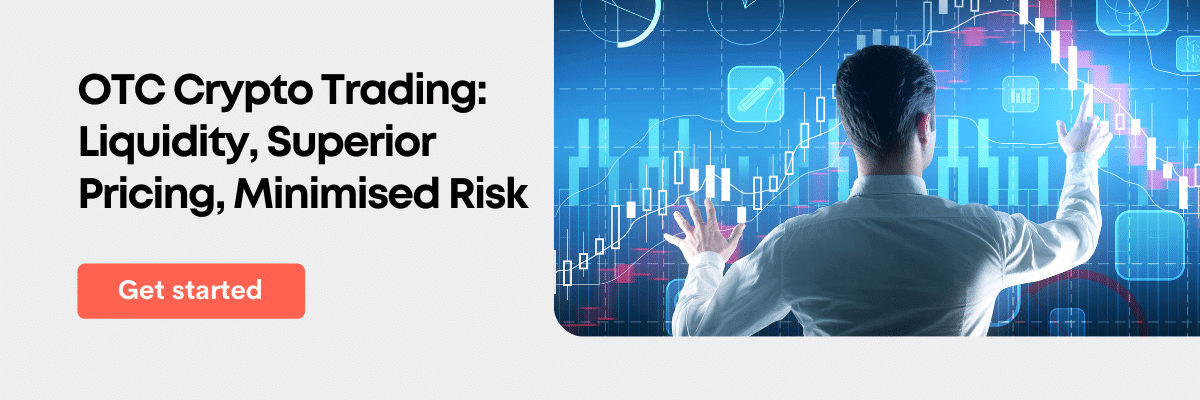Content
- Enhancing Supply Chain Management
- Transparency and Traceability
- Efficiency and Cost Reduction
- Revolutionizing Financial Services
- Cross-border Payments
- Regulatory Compliance
- Asset Management
- Streamlining Healthcare Operations
- Secure Patient Data Management
- Clinical Trials and Drug Traceability
- Innovating Real Estate Transactions
- Fractional Ownership and Tokenization
- Land Registration and Management
- Facilitating Environmental, Social, and Governance (ESG) Compliance
- Environmental Impact Tracking
- Social Governance
- Conclusion
- FAQs
- 1. How does blockchain improve supply chain management?
- 2. What are the benefits of blockchain in financial services?
- 3. How can blockchain technology benefit the healthcare industry?
- 4. What is the role of blockchain in real estate?
- 5. How does blockchain support ESG compliance?
- About Zerocap
- DISCLAIMER
17 Jun, 24
Blockchain Business Applications: Improving Any Sector

- Enhancing Supply Chain Management
- Transparency and Traceability
- Efficiency and Cost Reduction
- Revolutionizing Financial Services
- Cross-border Payments
- Regulatory Compliance
- Asset Management
- Streamlining Healthcare Operations
- Secure Patient Data Management
- Clinical Trials and Drug Traceability
- Innovating Real Estate Transactions
- Fractional Ownership and Tokenization
- Land Registration and Management
- Facilitating Environmental, Social, and Governance (ESG) Compliance
- Environmental Impact Tracking
- Social Governance
- Conclusion
- FAQs
- 1. How does blockchain improve supply chain management?
- 2. What are the benefits of blockchain in financial services?
- 3. How can blockchain technology benefit the healthcare industry?
- 4. What is the role of blockchain in real estate?
- 5. How does blockchain support ESG compliance?
- About Zerocap
- DISCLAIMER
Blockchain technology, initially synonymous with cryptocurrencies like Bitcoin, has evolved into a multifaceted tool with significant applications across various traditional business sectors. This evolution is driven by blockchain’s inherent properties of transparency, security, and decentralization. As businesses seek to enhance operational efficiency, transparency, and trust, blockchain emerges as a transformative force. This article explores the diverse applications of blockchain technology in traditional finance (TradFi) and other industries, illustrating how it is reshaping business paradigms.


Enhancing Supply Chain Management
Supply chain management is a critical area where blockchain technology is making a substantial impact. Traditional supply chains often suffer from inefficiencies, lack of transparency, and susceptibility to fraud. Blockchain addresses these issues by providing an immutable and transparent ledger that records every transaction across the supply chain.
Transparency and Traceability
Blockchain enables end-to-end visibility in supply chains, allowing all participants to access the same information in real time. This transparency helps in tracking the provenance of goods, ensuring authenticity, and preventing counterfeiting. For instance, IBM’s blockchain platform enhances supply chain transparency by creating unalterable records, enabling faster and more efficient transactions and reducing fraud.
Efficiency and Cost Reduction
By eliminating intermediaries and automating processes through smart contracts, blockchain significantly reduces administrative costs and speeds up transactions. In the food industry, for example, blockchain helps trace the source of contamination within seconds, rather than days, ensuring food safety and reducing waste.
Revolutionizing Financial Services
Blockchain’s application in financial services is perhaps the most transformative, promising to revolutionize TradFi by enhancing efficiency, security, and accessibility.
Cross-border Payments
Cross-border transactions traditionally involve multiple intermediaries, leading to delays and high costs. Blockchain streamlines this process by enabling peer-to-peer transfers without the need for intermediaries, thus reducing transaction fees and processing times. This is particularly beneficial for banks and customers involved in frequent international transactions.
Regulatory Compliance
Blockchain’s transparent and auditable nature helps financial institutions meet regulatory requirements more efficiently. It provides a clear audit trail of all transactions, aiding in the detection and prevention of suspicious activities and ensuring compliance with regulations.
Asset Management
Blockchain technology also enhances asset management by digitizing portfolios, improving liquidity, and enabling easier transfer of assets. It supports customizable privacy settings, ensuring that investor and stakeholder governance is both secure and transparent.
Streamlining Healthcare Operations
In the healthcare sector, blockchain technology offers significant benefits by enhancing data security, improving patient care, and reducing costs.
Secure Patient Data Management
Healthcare organizations struggle with data breaches and inefficient data management systems. Blockchain provides a secure, decentralized way to store and share patient data, ensuring that only authorized parties have access. This not only enhances security but also streamlines the sharing of medical records among providers, payers, and researchers.
Clinical Trials and Drug Traceability
Blockchain improves the management of clinical trials by securely recording and verifying patient data, ensuring the integrity of trial results. It also helps trace the journey of pharmaceutical products from manufacture to distribution, combating counterfeit drugs and enhancing patient safety.
Innovating Real Estate Transactions
The real estate industry, known for its reliance on paperwork and intermediaries, is also benefiting from blockchain technology.
Fractional Ownership and Tokenization
Blockchain enables the tokenization of real estate assets, allowing for fractional ownership. This means investors can buy and sell shares of a property, increasing liquidity and making real estate investment more accessible. Platforms built on blockchain facilitate seamless, borderless trading of these tokenized assets.
Land Registration and Management
Blockchain simplifies land registration processes by maintaining an immutable record of property titles, boundaries, and ownership changes. This reduces administrative costs, speeds up transactions, and prevents fraudulent activities. It also enhances property management by providing a secure, transparent system for tracking and managing property portfolios.
Facilitating Environmental, Social, and Governance (ESG) Compliance
As businesses increasingly prioritize ESG compliance, blockchain emerges as a key enabler, providing unmatched transparency and accuracy in reporting.
Environmental Impact Tracking
Blockchain records a company’s environmental impact in a transparent, immutable ledger, helping to combat greenwashing and ensure accurate reporting of sustainability efforts. This transparency fosters trust among stakeholders and enhances corporate accountability.
Social Governance
Blockchain verifies supply chain practices, ensuring that social responsibility commitments are upheld. It enables companies to demonstrate compliance with labour laws and ethical sourcing standards, turning social governance from a mere slogan into a measurable commitment.
Conclusion
Blockchain technology is rapidly transforming traditional business practices across various sectors by enhancing transparency, efficiency, and security. From supply chain management and financial services to healthcare and real estate, blockchain offers innovative solutions that address longstanding challenges and create new opportunities for growth. As businesses continue to explore and adopt blockchain applications, the technology’s potential to improve traditional finance (TradFi) and other industries becomes increasingly evident.
FAQs
1. How does blockchain improve supply chain management?
Blockchain enhances supply chain management by providing end-to-end visibility, ensuring transparency, and reducing fraud. It creates an immutable record of all transactions, improving traceability and efficiency.
2. What are the benefits of blockchain in financial services?
Blockchain reduces transaction costs, enhances security, and improves regulatory compliance in financial services. It enables faster cross-border payments and provides a transparent audit trail for all transactions.
3. How can blockchain technology benefit the healthcare industry?
Blockchain secures patient data, improves the management of clinical trials, and enhances drug traceability. It provides a decentralized system for storing and sharing medical records, ensuring data security and privacy.
4. What is the role of blockchain in real estate?
Blockchain facilitates fractional ownership and tokenization of real estate assets, enhances land registration processes, and provides a secure system for managing property portfolios. It reduces administrative costs and prevents fraudulent transactions.
5. How does blockchain support ESG compliance?
Blockchain provides transparent and accurate reporting of a company’s environmental and social governance efforts. It records environmental impact and verifies supply chain practices, ensuring compliance with sustainability and ethical standards.
About Zerocap
Zerocap provides digital asset liquidity and digital asset custodial services to forward-thinking investors and institutions globally. For frictionless access to digital assets with industry-leading security, contact our team at [email protected] or visit our website www.zerocap.com
DISCLAIMER
This material is issued by Zerocap Pty Ltd (Zerocap), a Corporate Authorised Representative (CAR: 001289130) of AFSL 340799. Material covering regulated financial products is issued to you on the basis that you qualify as a “Wholesale Investor” for the purposes of Sections 761GA and 708(10) of the Corporations Act 2001 (Cth) (Sophisticated/Wholesale Client). This material is intended solely for the information of the particular person to whom it was provided by Zerocap and should not be relied upon by any other person. The information contained in this material is general in nature and does not constitute advice, take into account the financial objectives or situation of an investor; nor a recommendation to deal. Any recipients of this material acknowledge and agree that they must conduct and have conducted their own due diligence investigation and have not relied upon any representations of Zerocap, its officers, employees, representatives or associates. Zerocap has not independently verified the information contained in this material. Zerocap assumes no responsibility for updating any information, views or opinions contained in this material or for correcting any error or omission which may become apparent after the material has been issued. Zerocap does not give any warranty as to the accuracy, reliability or completeness of advice or information which is contained in this material. Except insofar as liability under any statute cannot be excluded, Zerocap and its officers, employees, representatives or associates do not accept any liability (whether arising in contract, in tort or negligence or otherwise) for any error or omission in this material or for any resulting loss or damage (whether direct, indirect, consequential or otherwise) suffered by the recipient of this material or any other person. This is a private communication and was not intended for public circulation or publication or for the use of any third party. This material must not be distributed or released in the United States. It may only be provided to persons who are outside the United States and are not acting for the account or benefit of, “US Persons” in connection with transactions that would be “offshore transactions” (as such terms are defined in Regulation S under the U.S. Securities Act of 1933, as amended (the “Securities Act”)). This material does not, and is not intended to, constitute an offer or invitation in the United States, or in any other place or jurisdiction in which, or to any person to whom, it would not be lawful to make such an offer or invitation. If you are not the intended recipient of this material, please notify Zerocap immediately and destroy all copies of this material, whether held in electronic or printed form or otherwise.
Disclosure of Interest: Zerocap, its officers, employees, representatives and associates within the meaning of Chapter 7 of the Corporations Act may receive commissions and management fees from transactions involving securities referred to in this material (which its representatives may directly share) and may from time to time hold interests in the assets referred to in this material. Investors should consider this material as only a single factor in making their investment decision.
Like this article? Share
Latest Insights
Weekly Crypto Market Wrap: 21st October 2024
Zerocap is a market-leading digital asset firm, providing trading, liquidity and custody to forward-thinking institutions and investors globally. To learn more, contact the team at
CoinDesk Spotlights Zerocap | Bitcoin-Dollar Correlation Shaken Ahead of U.S. Election
Read more in a recent article in CoinDesk. 21 October, 2024: As the U.S. presidential election on November 5 approaches, financial markets are shifting rapidly, with
The Defiant Featured Zerocap | Bitcoin Breaks $65K as Short Traders Face Liquidations
Read more in a recent article in The Defiant and our 14th October Edition Weekly Wrap. 16 October, 2024: The cryptocurrency market experienced a significant
Receive Our Insights
Subscribe to receive our publications in newsletter format — the best way to stay informed about crypto asset market trends and topics.



 Share
Share  Tweet
Tweet  Post
Post 